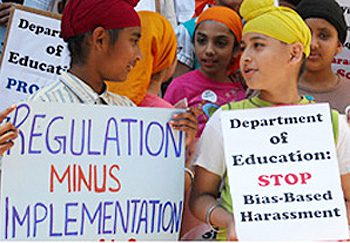“Let’s start with the obvious: There were more than a few believers who could accurately be described as ‘fundamentalists’ at the Gov. Rick Parry’s combination prayer rally and pre-White House campaign trial balloon festival,” observes the GetReligion.org website.
“Let’s start with something just as obvious: There were plenty of people at the rally (simply based on the official list of those who signed on) who could not accurately be described as ‘fundamentalists’ under the historic — and, thus, Associated Press Stylebook endorsed — definition of the term.”
Yet, the Los Angeles Times branded everybody there “fundamentalists” notes the website, whose slogan is “The press … just doesn’t get religion,” continues: “Thus, it is appropriate to ask what in the heckfire the editors of the Los Angeles Times were thinking when they approved this lede for their main hard-news report on this controversial event:”
With Rick Perry likely to enter the Republican presidential race within days or weeks, thousands of fundamentalist Christians cheered the Texas governor Saturday at a stadium prayer rally that appeared to boost his standing with religious conservatives, a key GOP voting bloc.
Perry organized the daylong service of prayer and fasting, featuring appearances by prominent figures on the Christian right. Stadium officials said the crowd exceeded 30,000, far more than any event staged by the announced Republican presidential contenders.
“I realize that most GetReligion readers who work in journalism almost certainly know the following passage by heart now,” writes a GetReligion.org blogger, “but let’s take another look at the AP stylebook’s wise and historically accurate advice on how to handle the term ‘fundamentalist.'”
fundamentalist: The word gained usage in an early 20th century fundamentalist-modernist controversy within Protestantism. In recent years, however, fundamentalist has to a large extent taken on pejorative connotations except when applied to groups that stress strict, literal interpretations of Scripture and separation from other Christians.
In general, do not use fundamentalist unless a group applies the word to itself.
Yet, the Times did it anyway.
“That stated,” continues GetReligion.org, “a glance at the official national endorsement list (a source tapped in few, if any, news reports) for this event reveals that some true fundamentalists were, in fact, in the house.
“At the same time, there were evangelicals present — author Max Lucado leaps to mind — who could never be called a ‘fundamentalist.’ Then again, perhaps the dominant stylistic influence on the event came from charismatic churches and, trust me, there are scores of important and divisive theological differences between Pentecostal believers and true fundamentalists. And what does one do with retired Bishop John Yanta of Texas, Sam Brownback and the few other Catholic leaders (clergy and laity) who dared to endorse the event?
“The obvious question: Have we reached the point where any Christian believer whose doctrine of scripture and church tradition is high enough to believe that sex outside of marriage is a sin will now be called a ‘fundamentalist’?”
Or does the Times just not realize what the Associated Press does — that it’s a smear to brand anybody with a label “has to a large extent taken on pejorative connotations?”


